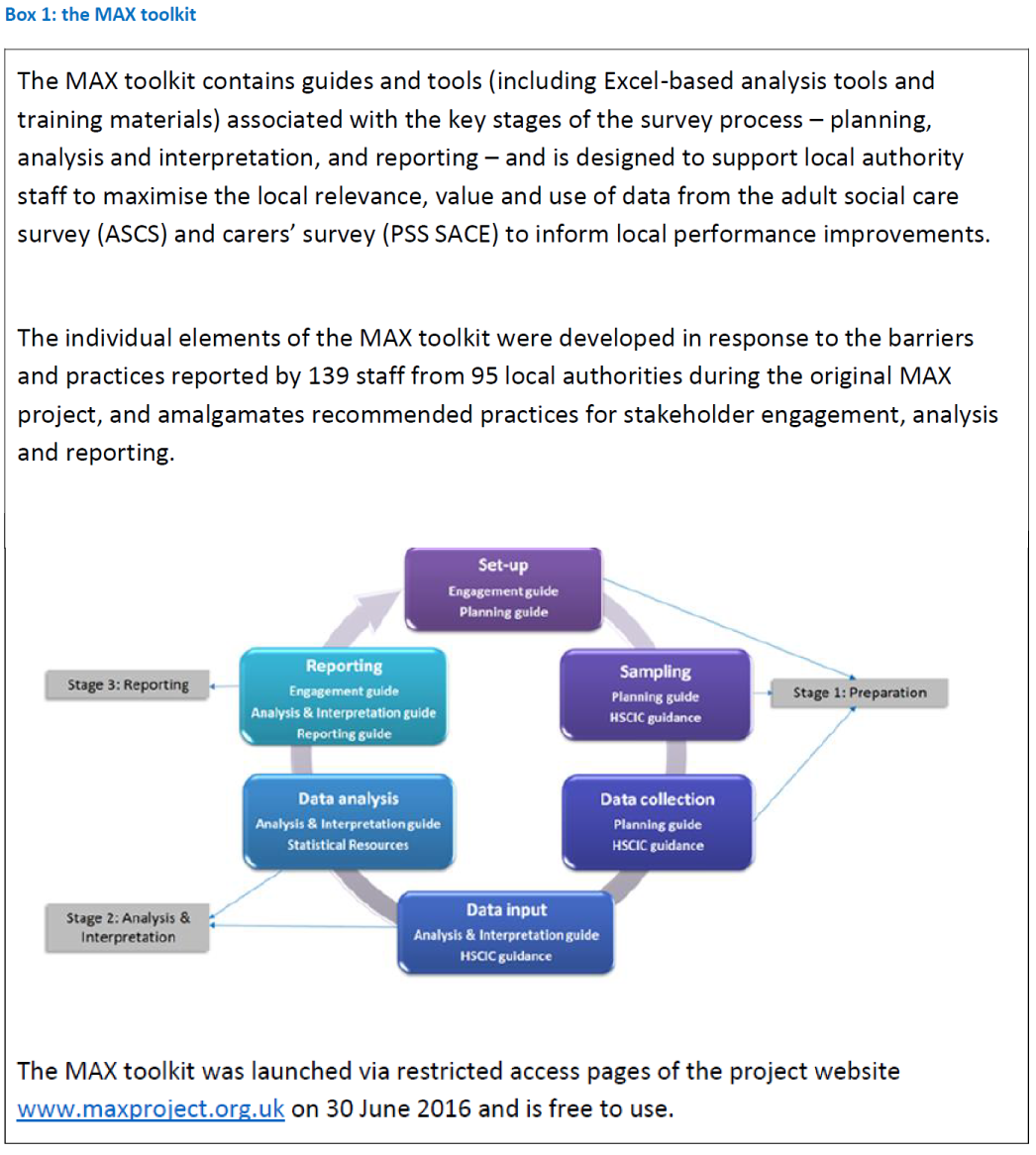Background
Local authorities (LAs) in England are required to conduct the Adult Social Care Survey (ASCS) and the Personal Social Services Survey of Adult Carers in England (PSS SACE or Carers Survey) as part of their annual data returns to NHS Digital (formerly, the Health and Social Care Information Centre or HSCIC).1 The data from these surveys are used to populate indicators in the Adult Social Care Outcomes Framework (ASCOF), which are used by central government to monitor the quality of social care, and can be used locally by LAs to inform local social care-related planning and service/performance improvements.
While LAs generally support the ASCS and PSS SACE, informal feedback indicated that staff from all groups and within many organisations were not engaging with the surveys and/or were making limited local use of the data. The Maximising the value of survey data in adult social care (MAX) project was set up in 2012 to further explore these issues and to develop appropriate support. The feedback collected during the project research activities and consultations with LA staff led to the development of the MAX toolkit (see box 1 below).
Aims
The primary purpose of the current project is to explore how local authorities (LAs) have
used – or are currently using – the MAX toolkit, and the impact of the MAX toolkit on local
practice (e.g. analysis, decision-making). This will be achieved by engaging with staff
associated with the surveys who have used the MAX toolkit – or who have a colleague who
is using the toolkit – through a range of activities and consultations.
A secondary purpose of the project is to generate evidence that may encourage other LAs to
use the toolkit or, where they have done so already, other elements of the toolkit. This will
be achieved by collaborating with LA staff on the development of case studies of local
practice improvements as a result of using the toolkit.
Methods
In-depth qualitative telephone interviews: will be used to explore [1] the local application
and impact of the MAX toolkit as a strategy to help LAs use ASCS and PSS SACE data; and [2]
the extent to which the MAX toolkit has had an impact on LAs using the ASCS and PSS SACE
data to inform local performance improvements. These interviews will be conducted with
staff from up to ten LAs, purposefully selected to maximise the representation of LA types
and regions, and will be semi-structured to enable participants to answer in their own
words. It is anticipated that interviews will be conducted between August 2017 and June
2018.
Case studies and worked examples: the findings from the in-depth interviews, where
permitted, will be used to develop draft case studies and worked examples. These will
highlight how the MAX toolkit has:
- helped LA analysts to produce and disseminate ASCS and PSS SACE analysis findings
that can inform or change local performance improvement activities; and, by doing
so, has - had an impact on the general perceptions about the potential local value and use of
survey data among LA analysts and potential consumers (e.g. managers,
commissioners).
Draft case studies and worked examples will be developed and refined in collaboration with
the participating LA and will be made available in either anonymised or non-anonymised
form in the MAX toolkit.
Planned outputs
The project team plan to report findings through discussion papers, journal articles, blogs
and presentations at appropriate conferences. Journal articles based on case study
examples will also be co-authored with collaborating LA users where possible.
Research team
Karen Jones, Clara Heath and Diane Fox.
1Please note that the ASCS is conducted every year, while the PSS SACE is conducted every other year.

